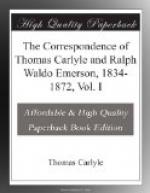which otherwise I cannot but be sorry, poor Fraser
within the Cockney limits being really a worthy, accurate,
and rather friendly creature. So you see me
here provided with bread and water for a season,—it
is but for a season one needs either water or bread,
—and rejoice with me accordingly.
It is the one useful, nay, I will say the one
innoxious,
result of all this trumpeting, reviewing, and dinner-invitationing;
from which I feel it indispensable to withdraw myself
more and more resolutely, and altogether count it
as a thing not there. Solitude is what I long
and pray for. In the babble of men my own soul
goes all to babble: like soil you were forever
screening, tumbling over with shovels and riddles;
in
which soil no fruit can grow! My
trust in Heaven is, I shall yet get away “to
some cottage by the sea-shore”; far enough
from all the mad and mad making things that dance
round me here, which I shall then look on only as a
theatrical phantasmagory, with an eye only to the
meaning
that lies hidden in it. You, friend Emerson,
are to be a Farmer, you say, and dig Earth for your
living? Well; I envy you that as much as any
other of your blessednesses. Meanwhile, I sit
shrunk together here in a small
dressing-closet,
aloft in the back part of the house, excluding all
cackle and cockneys; and, looking out over the similitude
of a May grove (with little brick in it, and only
the minarets of Westminster and gilt cross of St.
Paul’s visible in the distance, and the enormous
roar of London softened into an enormous hum), endeavor
to await what will betide. I am busy with Luther
in one Marheinecke’s very long-winded Book.
I think of innumerable things; steal out westward
at sunset among the Kensington lanes; would this
May
weather last, I might be as well here as in any attainable
place. But June comes; the rabid dogs get muzzles;
all is brown-parched, dusty, suffocating, desperate,
and I shall have to run! Enough of all that.
On my paper there comes, or promises to come,
as yet simply nothing at all. Patience;—and
yet who can be patient?
Had you the happiness to see yourself not long ago,
in Fraser’s Magazine, classed nominatim
by an emphatic earnest man, not without a kind of
splay-footed strength and sincerity,—among
the chief Heresiarchs of the—world?
Perfectly right. Fraser was very anxious to
know what I thought of the Paper,—“by
an entirely unknown man in the country.”
I counseled “that there was something in him,
which he ought to improve by holding his peace for
the next five years.”
Adieu, dear Emerson; there is not a scrap more of
Paper. All copies of your Essays are
out at use; with what result we shall perhaps see.
As for me I love the Book and man, and their noble
rustic herohood and manhood:—one voice as
of a living man amid such jabberings of galvanized
corpses: Ach Gott!
Yours evermore,
T.
Carlyle




